- Welcome
- Noir Zine
- Allan Guthrie
- Books
"...those who enjoy the darker side of the genre are in for some serious thrills with this..."
Laura Wilson, The Guardian

Published in the UK by Polygon (March 19th, '09) and in the US by Houghton Mifflin Harcourt (Nov '09).
The Plumber's Union: Tom Piccirilli
interviewed by Allan Guthrie
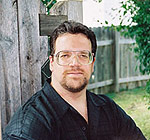 Tom Piccirilli is best known as an award-winning horror writer. Recently, though, his writing has taken a new direction, and he’s now making serious in-roads into crime fiction. Whether he’s writing horror or crime, you can rest assured that he delivers the kind of story that’ll knock not just your socks off but the rest of your underwear too. Allan Guthrie had the pleasure of talking to the man who writes some of the best prose around today.
Tom Piccirilli is best known as an award-winning horror writer. Recently, though, his writing has taken a new direction, and he’s now making serious in-roads into crime fiction. Whether he’s writing horror or crime, you can rest assured that he delivers the kind of story that’ll knock not just your socks off but the rest of your underwear too. Allan Guthrie had the pleasure of talking to the man who writes some of the best prose around today.
Allan Guthrie: When did you start writing and what was your motivation?
Tom Piccirilli: I suppose I started for the same reason that all young guys start writing. For the hot chicks.
AG: And did it work?
TP: Yes, but they didn’t start coming around for twenty years, until after I was married.
AG: And you’ve written how many books?
TP: Twenty novels now. Plus three short story collections, three poetry collections, and a mess of chapbooks.
AG: What’s your motivation these days?
TP: The older one gets the clearer the themes and topics that make up the writing become. You discover the sound of your voice. You find the deeper substance of your work. It’s not merely saying something, but having something to say. Not merely telling stories, but the stories that teach the writer something about himself. What his priorities are, what his values are, what his beliefs might be. The more you write, the more you learn about yourself. And the more experiences you have, the more you find to write about.
AG: With the recent release of The Fever Kill and the impending publication of The Cold Spot, would it be safe to say your focus seems to have drifted away from horror and into the crime field?
TP: As I hurl shrieking into middle age, I feel a greater affinity for crime fiction. I seem to be more concerned with writing more realistic, authentic material. I feel comfortable with the crime field because in essence when you purify and distill horror you wind up with crime. Crime against man, crime against God, or crime against nature. Whether your monster is a werewolf or a serial killer or a bank robber, it boils down to somebody fucking up someone else’s day.
AG: I believe some knucklehead Scottish crime writer once said he thought noir was horror without the supernatural. You think he was talking out of his arse?
TP: I don’t think you necessarily need the supernatural to make a story horror. It’s all about emphasis. If you emphasize the horrific and the terrifying, you’re probably writing horror. If you emphasize the tragic, the despairing, and do it within the setting and atmosphere of a crime story, you’re probably writing noir.
AG: The Fever Kill was one of my books of the year in ‘07. It’s paced like a contemporary Gold Medal novel. In tone it reminds me of Jim Thompson and Peter Rabe, guys who wrote books about a skewed reality, not the banal one we face every day. The writing itself is more like Charles Williams or Malcolm Braly. Tell us a little bit about the book.
TP: Although I’d been inching more and more towards the crime genre, I wanted to throw myself in whole-heartedly and do something right off the bat that would pay homage to all the classic GM writers who meant so much to me. For years I’d been a big fan of Thompson, Goodis, Rabe, Williams, Brewer, Fischer, MacDonald, Brown, and on and on. So I very much wanted to write a novel with a classical set-up (cop returns to corrupt small hometown where his disgraced father died in order to discover what truly happened during a botched kidnapping) but bring my own sensibilities to it. Throw in lots of dark humor, scenes that hinged on the nearly surreal (there’s an exchange between my protagonist and a talking teddy bear), the burden of personal history, the search for identity, some vicious action. Hopefully folks who love classic stuff and folks who dig neo-noir will both find plenty here to enjoy.
AG: The Fever Kill is published very handsomely by Creeping Hemlock Press, a new press to me. Can you tell us a little bit about how that deal came about?
TP: RJ & Julia Sevin, the husband & wife publisher-editor team at CHP, had previously invited me to an anthology they were putting together called Corpse Blossoms, which was a huge and fine antho of horror-suspense. We clicked together during that foray and they decided to make their next project the release of my offbeat crime novella "Frayed." We worked closely together and worked well together and it seemed natural that we’d continue with our relationship. So when they asked if I had anything else they might pursue, I turned over The Fever Kill to them. It was a good decision on my part because they’re both brilliant designers who picked up on the pulp feel of the book and decided to run with it in their layout and look of the novel.
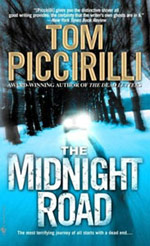 AG: You’ve published a number of books with Bantam (The Midnight Road, The Dead Letters, Headstone City), with more to come. But you’ve published with a number of smaller presses too. What’s your take on the role of small presses?
AG: You’ve published a number of books with Bantam (The Midnight Road, The Dead Letters, Headstone City), with more to come. But you’ve published with a number of smaller presses too. What’s your take on the role of small presses?
TP: I’m happy as hell that they exist. They’re often a market for what might be considered the less commercial or the hard to pigeonhole works, and it’s a chance for an author to work much more closely and have a greater hand in the look and feel of his own final product. Because the publishers are smaller and naturally have a larger stake of finances, time, and effort involved, they tend to really push product hard. Sometimes the most major reviews and notice come from works that first see print in the independent presses.
AG: What’s the secret to being so prolific?
TP: Being a slave to the great fucking god Mortgage.
AG: Ha! You’re not escaping that lightly, though. I’m sure the Big M is a motivator for a lot of writers, but what about the way you write: do you have a routine; do you aim for a set word count; do you write for a set number of hours?
TP: I try to write a thousand words a day or so, but if I don’t make it I usually don’t beat myself up about it. Some days you feel the excitement of facing the empty page, some days you don’t. The thing is, you can’t go without it for too long. It’s so easy to become complacent and lazy. I burn out easily, so I try to juggle the writing amid other things. I read for a while, then write. I watch movies, then write for a bit. I’ll walk the dogs around the park, then write. It keeps me in the mind-set, and it keeps me from learning to hate the page.
AG: What’s a good (as opposed to average) day’s output?
TP: I don’t think I’ve ever written more than 2k words in a day. It’s just not the way I’m built. I can’t go further than that without the quality being affected. So long as I get 1k or more, I consider it a solid writing day.
AG: Are you a rewriter or are you one of these bastards who gets the words right first time?
TP: Are there bastards who get the words right the first time? If so, then I hate those fuckers. But I think most of us are forced to revise to some extent. But I’d rather write as cleanly as possible the first time around to avoid having to do serious revisions later on. I know a lot of writers who want to write as much as they can as fast as they can the first time out, and leave all the rewriting until after they’ve finished. But I think it’s much harder that way, and it’s much easier to become discouraged. You get to the end of your novel and think, Finally, I’m done. And then you go back to revise and realize all the shit that still needs to be fixed. Characters who’ve dropped out of the book, plotlines that come to nothing, weak prose. I’d rather get it down as right as I can the first time, even if it slows my pace down considerably.
AG: We’re all led to believe that a successful novel must have a sympathetic protagonist. What do you say?
TP: If by sympathetic you mean someone you feel a great emotional bond with, then I say that’s not always a necessity. If by sympathetic you mean someone we root for because we’re caught up in their story and we want them to win out, despite them possibly being villains or assholes or both, then yes. Richard Stark’s Parker novels have a protagonist that no one could ever like in real life. He‘s a cruel professional thief and a heartless killer. But in the context of the stories themselves, we become so caught up in Parker’s big scores and his dark world of crime. We want him to kick everybody’s ass, and we don’t feel all that sorry for the innocents who might be hurt along the way. Because we fall into his mindset. That’s the power of a writer like Stark (Donald Westlake). He makes us love the unlovable. Hell, everyone knows the villain is the most interesting character in most tales, and it’s through that interest that we become connected. It’s what we’ve invested in them.
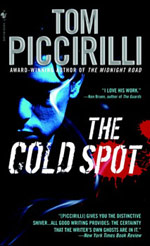 AG: Tell us a little about your next novel, The Cold Spot.
AG: Tell us a little about your next novel, The Cold Spot.
TP: It’s the first in a new crime series which follows a young thief and getaway driver named Chase, raised by his brutal career criminal grandfather, Jonah, who have a falling out after the old man kills one of his own crew. They part company and Chase eventually goes straight, marries a cop, and for years lives a contented, average life. But when tragedy strikes (I mean, this is noir, you just KNEW that tragedy was going to strike, didn’t you?) Chase has to seek out Jonah once again in an effort to find and get revenge on a group of diamond heisters.
Along with that main thrust of the action there’s plenty of room to move among a couple of sub-plots involving Chase and Jonah’s turbulent and conflicted relationship. The bad blood between them and Chase’s search for identity are natural extensions of the iconic main storyline.
The follow-up novel The Coldest Mile should follow nine or ten months further on down the line.
AG: When’s the release date?
TP: The Cold Spot will hit shelves April 29th.
AG: Back to something you said earlier when you mentioned themes becoming clearer as you get older. Have you noticed any recurring themes? If so, do have an understanding of your exploration of these subjects, or do they just come to you from that part of your subconscious that you don’t want to analyze too much?
TP: The themes are probably as obvious to me as they are to anybody else who reads my stuff. The nature of identity--what makes us who we are, our pasts, our pains, our hopes, our genetics, our social surroundings, all of that or something more? The conflicts involved in familial relationships-the love/hate relationships we might have with our parents or siblings or even our children, the nature of that dysfunction, the bad blood, the forgiveness and understanding. Certain elements just work their way in. The missing but important father figure, the dying mother figure, the ghostly lost love. I don’t really explore them on a conscious level, it’s just the sort of thing that happens in the midst of my work. In fact, sometimes I have to consciously force myself not to tackle certain themes and say, "Okay, in this story, no more goddamn dead fathers, no hospitalized mothers."
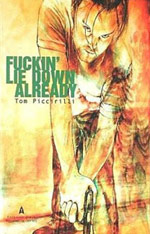 AG: One of the first books of yours I read was Fuckin’ Lie Down Already, kindly loaned to me by a big fan of yours, Duane Swierczynski. I did try to buy my own copy, but it seems the book is impossible to get hold of. You ever think we’ll see a reissue? What’s the deal there?
AG: One of the first books of yours I read was Fuckin’ Lie Down Already, kindly loaned to me by a big fan of yours, Duane Swierczynski. I did try to buy my own copy, but it seems the book is impossible to get hold of. You ever think we’ll see a reissue? What’s the deal there?
TP: It was originally put out by a small press that did a handful of gorgeous limited editions and promptly disappeared from the scene. I contacted the publisher not long ago asking if he had any copies I could buy off him. He told me he had boxes in a closet somewhere and he’d send them to me. Not only didn’t he, but he immediately fell off the planet again. But the novella will see reprint in an upcoming collection of mine due out from Cemetery Dance Publications called Futile Efforts. It’ll have something like twenty-five stories collected over the last however many years, each piece with an introduction by a different author in the horror/crime field. Jack O’Connell (whose next novel The Resurrectionist is a brilliant mixture of crime, horror, and fantasy elements) did the intro to FLDA.
AG: How did you first get published in book form?
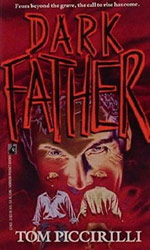 TP: I sold my first novel Dark Father the summer I graduated college. And thank Christ I did because I still don’t know what the hell I would do with an English degree.
TP: I sold my first novel Dark Father the summer I graduated college. And thank Christ I did because I still don’t know what the hell I would do with an English degree.
AG: You’re unusual in the modern publishing world in that you don’t have an agent. Which quite possibly explains how you’ve published so many books! How did you come to represent yourself and how do you find publishers respond?
TP: There are times when I really wish I had an agent to read all the microscopic print on contracts and make sure I’m not signing away my spleen or something. But the five agents I’ve had over the last twenty years were never able to sell anything for me. I’m not quite sure they really understood where I was coming from, and they seemed more interested in telling me not to write what I was writing and to start writing like somebody else in the field than they were in selling my work. Maybe it was just a clash of personalities. Maybe I’m just too far down on the midlist for them to bother giving me the time that I wanted. Whatever the reason, we always parted company under storm clouds and without them making any sales. So, for the time being, I continue dealing with editors and publishers on my own. So far it seems to have worked out okay, but who knows--an agent might’ve gotten me bigger and better deals, or might have just tossed the manuscripts in a drawer someplace.
AG: Any words of advice for young writers trying to break into the crime or horror fields?
TP: Listen to your mothers and go into accounting. Listen to your fathers and join the plumbers’ union. Be a construction worker. Become a teacher. If you’re too reckless, foolhardy, and demented to listen, then there might be a chance for you in this insane biz. Make sure that you love the field, that you read and study and are passionate about and truly love the literature. Don’t go in thinking, "This book sucks, I can do better!" Go in with a joy for the novels and the stories, and with the real heart of a fan. Writing is a slow, frustrating, painful process in the moment, and the only thing that will keep you nailed to the empty page is your single-minded focus on wanting to accomplish something significant.
But seriously, think about the plumbers’ union.
###
Copyright © Noir Originals, 2008
